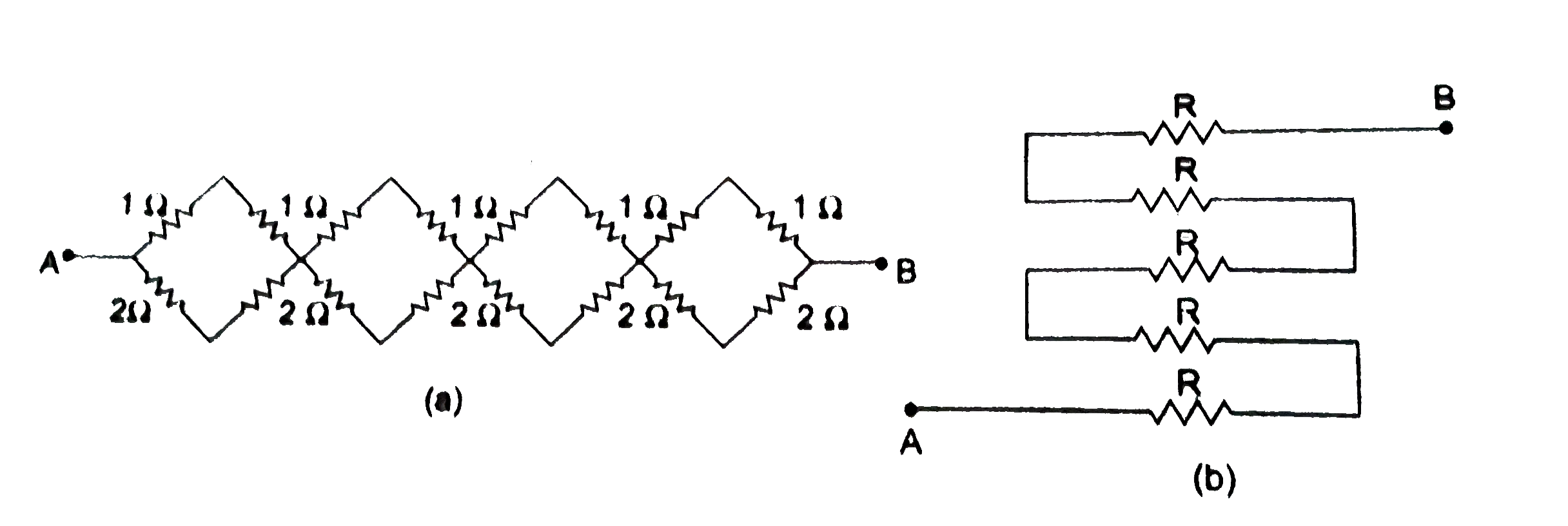(a) Given n resistores each of resistance R. how will you combine them to get the (i) maximum (ii) minimum effective resistance?
(b) Given the resistances of 1Ω,2Ω,3Ω. how will be combine them to get an equivalent resistance of (i)(11/3)Ω(ii)(11/5)Ω,(iii)6Ω,(iv)(6/11)Ω ?
(c ) Determine the equivalent resistance of networks shown in
 Solution in Gujrati
Solution in Gujrati
When given resistances are all connected in series, equivalent resistance is maximum.
here,
Rmax=RS=nR
When given resistances are all connected in parallel, equivalent resistance is minimum.
Here,
Rmin=Rp=Rn
Required ratio = RmaxRmin=nRRn=n2
Topper's Solved these Questions
- CURRENT ELECTRICITYBook:KUMAR PRAKASHANChapter:CURRENT ELECTRICITYExercise:SECTION [B] (NUMERICAL FROM .DARPAN. BASED ON TEXTBOOK)
Explore 13 Videos
- CURRENT ELECTRICITYBook:KUMAR PRAKASHANChapter:CURRENT ELECTRICITYExercise:SECTION [B] (NUMERICAL)
Explore 10 Videos
- CURRENT ELECTRICITYBook:KUMAR PRAKASHANChapter:CURRENT ELECTRICITYExercise:SECTION [B] NUMERICALS (NUMERICAL FROM TEXTUAL ILLUSTRATIONS)
Explore 14 Videos
- BOARD'S QUESTION PAPER MARCH-2020 Book:KUMAR PRAKASHANChapter:BOARD'S QUESTION PAPER MARCH-2020 Exercise:PART-B SECTION -C
Explore 4 Videos
- DUAL NATURE OF RADIATION AND MATTERBook:KUMAR PRAKASHANChapter:DUAL NATURE OF RADIATION AND MATTERExercise:Section-D (MCQs asked in GUJCET/Board Exam)
Explore 1 Video
Similar Questions
The current through a wire varies with time as I=I0+αt, where I0=10 A and α=4As−1 . The charge that flows across a cross-section of the wire in first 10 seconds is .....
View SolutionOne copper wire having resistivity 1.7 ×10−8Ω, density 8.9×103kgm−3, atomic weight 63.5 g mol−1 , length 0.1 m and cross-sectional area 10−6m2carries 1 A electric current. Find (i) potential difference across the wire (ii) drift velocity of free electron. (Avogadro number = 6.02×1023 mol−1 and valency of copper - 1
View Solution(a) Esttimate the average drift speed of conduction electrons in a copper wite of cross-secttonal area 1.0×10−7m2 carrying a current of 1.5A. Assume the each copper atom contrbutes roughly one conduction electron. The density of copper is 9.0×103kg/m3, and its atomic mass is 63.5u. (b) Compare the drift speed obyained above with, (1) thermal speeds of copper atoms at ordinary temperaturtes. (ii) speed of propagation of electric field along the conductor which causes the drift motion.
View SolutionDerive an expression for current I passing through an AC circuit containing only inductor L. Draw a Phasor diagram and graph of v and I versus ωt. Explain instantaneous power and the average power.
View SolutionMass of photon in motion is ………
View Solution(a) Given n resistors each of resistance R . How will you combine them to get the (i) maximum (ii) minimum effective resistance ? What is the ratio of the maximum to minimum resistance ? (b) Given the resistances of 1 Omega, 2 Omega, 3 Omega , how will you combine them to get an equivalent resistance of (i) (11//3)Omega (ii) (11//5)Omega (iii) 6 Omega (iv) (6//11) Omega ? (c) Determine the equivalent resistance of networks shown in Figure.
View SolutionGiven the resistance of 1Ω,2Ω,3Ω, how will you combine them to get an e3quivalent resistance of :
113Ω (ii)115Ω (iii)6Ω 611Ω ?
View Solution(a) आपको R प्रतिरोध वाले n प्रतिरोधक दिए गए है । (i) अधिकतम (ii) न्यूनतम प्रभावी प्रतिरोध प्राप्त करने के लिए आप इन्हें किस प्रकार संयोजित करेंगे ? अधिकतम और न्यूनतम प्रतिरोधों का अनुपात क्या होगा ?
(b) यदि 1Ω,2Ω,3Ω के तीन प्रतिरोध दिए गए हों तो उनको आप किस प्रकार संयोजित करेंगे कि प्राप्त तुल्य प्रतिरोध हों : (i)(11/3)Ω,(ii)(11/5)Ω,(iii)6Ω,(iv)(6/11)Ω?
(c) चित्र 3.31 में दिखाए गए नेटवर्कों का तुल्य प्रतिरोध प्राप्त कीजिए ।

View SolutionGiven the resistances of 1 Omega, 2 Omega, 3 Omega how will be combine them to get an equivalent resistance of (i) (11/3) Omega (ii) (11/5) Omega (iii) 6 Omega (iv) (6//11) Omega
View Solutionयदि 1Ω,2Ω,3Ω के तीन प्रतिरोध दिए गए हो, तो उनको आप किस प्रकार संयोजित करेंगे की प्राप्त तुल्य प्रतिरोध हो - (i) (11/3)Ω (ii) (11/5)Ω (iii) 6Ω (iv) (6/11)Ω ?
View Solution(a) R प्रतिरोधवाले n प्रतिरोधकों को लेकर आप उन्हें किस प्रकार जोड़ेंगे ताकि तुल्य प्रतिरोध (i) महत्तम तथा (ii) न्यूनतम हो ? महत्तम तथा न्यूनतम प्रतिरोधों का अनुपात क्या होगा ?
(b) यदि 1Ω,2Ω,3Ω के तीन प्रतिरोधक दिए गए हो, तो उन्हें आप किस प्रकार संयोजित करेंगे की तुल्य प्रतिरोध के मान (i) 113Ω,(ii)115Ω,(iii)6Ω.(iv)611Ω हो ?
(c) चित्र 2.1−7 (a) और (b) में प्रदर्शित प्रतिरोधकों के संयोजक के लिए A एवं B के बीच तुल्य प्रतिरोध ज्ञात करे।

View Solution(a) Given n resistores each of resistance R. how will you combine them to get the (i) maximum (ii) minimum effective resistance? (b) Given the resistances of 1 Omega, 2 Omega, 3 Omega. how will be combine them to get an equivalent resistance of (i) (11//3) Omega (ii) (11//5) Omega, (iii) 6 Omega, (iv) (6//11) Omega ? (c ) Determine the equivalent resistance of networks shown in
View SolutionGiven the resistances of 1Ω,2Ω,3Ω how will we combine them to get an equivalent resistance of (i) (113)Ω,(ii)(115)Ω,(iii)6Ω,(iv)(611)Ω ?
View SolutionGiven the resistances of 1Ω,2Ωand3Ω. How will you combine them to get an equivalent resistance of
(i) 113Ω ?
(ii) 115Ω ?
View SolutionGiven three resistors of resistances 1 Omega, 2Omega and 3Omega . How will you combine them to get an equivalent resistance of (11)/(5) Omega ?
View Solution(a) Given n resistores each of resistance R. how will you combine them to get the (i) maximum (ii) minimum effective resistance? (b) Given the resistances of 1 Omega, 2 Omega, 3 Omega. how will be combine them to get an equivalent resistance of (i) (11//3) Omega (ii) (11//5) Omega, (iii) 6 Omega, (iv) (6//11) Omega ? (c ) Determine the equivalent resistance of networks shown in
View Solution

